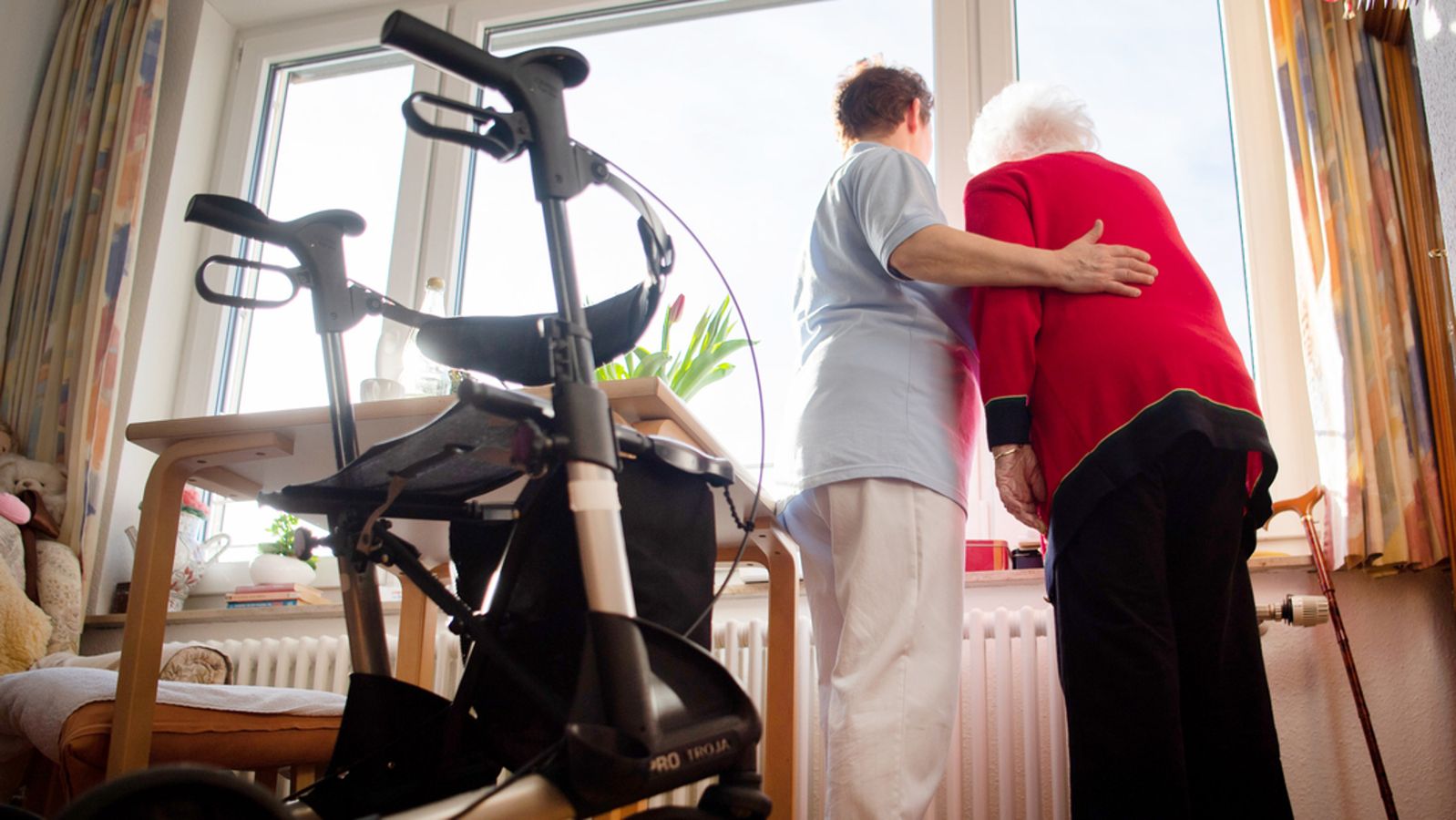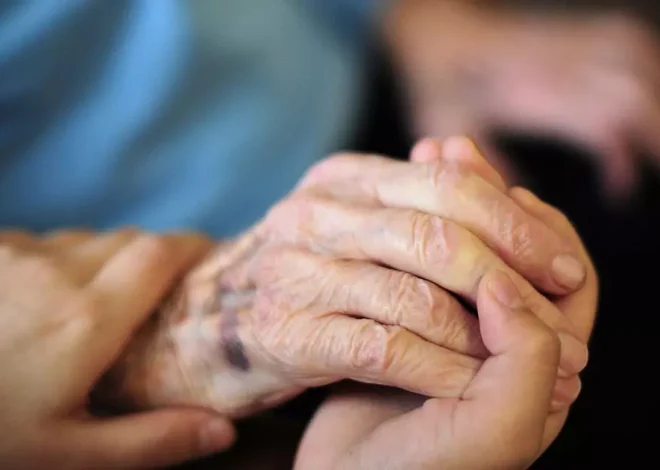
Care costs on the verge of collapse? | BR24
The cost spiral continues to spiral. This year too. For example, the Caritas Association of Bavaria increased the prices for nursing services in its outpatient services by a further 9.28 percent in March – after costs had already shot up by 24 percent in October last year. Overall, care at home became around a third more expensive within just six months.
High personnel costs, inflation and energy prices
This development is primarily due to higher personnel costs. The last round of wage negotiations led to “significant wage increases of up to 16.5 percent,” reports the Caritas Association for Munich and Freising. Other reasons for the cost explosion are inflation and rising energy prices.
Catch-up effects are also having an impact. In recent years, nursing care funds have “saved considerably” in negotiations with Caritas and other providers and have not adequately taken into account tariff increases. This has recently led to a “wave of insolvencies” particularly among smaller, outpatient nursing services. Caritas itself has also incurred “higher deficits”.
Bavarian Red Cross: Nationwide care provision at risk
The cost increases are becoming an increasingly serious problem, and not just for those in need of care. The providers themselves also see their economic situation increasingly at risk. Armin Petermann, deputy regional director of the Bavarian Red Cross, describes the situation as “very tense and even dramatic”.
The current reimbursement rates are “inadequate” despite price increases in recent years. In individual cases, the care of the insured is at risk due to possible business closures. There is serious concern that outpatient services of the Red Cross in Bavaria “can no longer ensure and maintain comprehensive care for the insured due to economic hardship.”
Costs in nursing homes: No relief in sight
It’s not just care at home that is becoming more and more expensive. The costs in old people’s and nursing homes are also continuing to rise. In 2023, prices in many homes will have risen considerably. In others, less so. However, those who were not so badly affected last year could face an even higher wave of costs this summer.
Doris Schneider, managing director of 27 Caritas nursing homes in Munich and Upper Bavaria, says that many people in need of care have been told that their monthly price will rise by 900 euros. It has not yet been decided whether this can be enforced in negotiations with nursing insurance companies and districts. Caritas assumes that it will be difficult to enforce such high demands this year as well. Last year, some residents were told that they would receive price increases of 800 euros, but in the end only 600 euros were approved.
Financial dependence is increasing
Whatever results are negotiated in the coming weeks or months, the consequences for those affected are significant. Doris Schneider expects that “many people may end up on welfare again” because they cannot finance themselves. On January 1st next year, the same people “may then be able to get out” of welfare again because the share that the nursing care insurance pays will then increase. The whole thing is a “constant back and forth” – in other words, an undignified spectacle for very old people who have worked all their lives and receive a pension.
Average pensions are not enough to cover care costs
Andreas Roß from Augsburg is also concerned that an average pension or equivalent civil servant pension is far from sufficient for care. His wife Gabriele Roß suffered a severe stroke four years ago and has been in need of care ever since. At the second attempt, they managed to find a good home for her within walking distance of their own apartment.
As everywhere in Bavaria, the high cost increases are a problem in this home too. Since this year, the 72-year-old has been paying around 400 euros more for his wife’s place in the home, a total of around 2,900 euros. The pension of just one partner is nowhere near enough to cover the monthly costs. Andreas Roß also has to invest a significant portion of his own pension.
Thanks to good planning, the couple manages to remain financially independent: “We have put a little bit aside that we can use when things get tight and tight.” He and his wife could still finance the higher prices together, “but the options will also run out at some point.”
Criticism of the care system: Impoverishment is increasing
Many of those affected can hardly voice their criticism of the rapidly increasing costs of care, as their age often means they are too physically and mentally restricted. Relatives also have to cope with the increasingly difficult financial conditions.
A letter of protest from relatives and residents of the Augsburg St. Afra retirement home shows how great the concerns have become. It is a friendly appeal to Health Minister Karl Lauterbach and the Federal Government’s care commissioner Claudia Moll to finally take action: people are grateful for the modern, good nursing home in Augsburg. But the twilight years are becoming “more and more of a financial risk due to the current cost trend and the structural errors in the care system.” The spiraling costs have already brought many residents onto social welfare “and the number is increasing.” A normal pension is no longer sufficient with a personal contribution of around 3,000 euros to the costs of the home. The current development is leading to an ever “further impoverishment of the residents of the home.”
Social association VdK calls for financial relief
While the protesting relatives and nursing home residents in Augsburg are demanding “fundamental and sustainable structural reforms” and “a change in nursing care insurance to full insurance,” social associations are also sharply criticizing the move. It is “a huge problem that nursing care costs are rising more and more today,” says Verena Bentele, chairwoman of the social association VdK Bavaria, who is also the federal chairwoman. Politicians are showing too little initiative to relieve the burden on those affected.
Verena Bentele highlighted some points of criticism in an interview with BR: For example, it is incomprehensible that “the training allowance still ends up with those affected and is not fully financed by the state.” Also, nursing home residents, who pay rent, should not have to pay additional so-called “investment costs.” In some cases, these are just as high or even higher than the actual rent. Investment costs should actually be “fully financed by the federal states,” says Bentele. They are responsible for building and maintaining an adequate and needs-based care infrastructure.
The high price increases are a “huge problem” and mean that more and more people have to apply for social assistance. At the moment, there is no end in sight to the cost increases. Increasingly, those affected can no longer afford care and are therefore less likely to seek help.
Saving on care services: risk of undersupply
The German Social Association considers the current situation to be alarming. It is becoming increasingly serious. The personal contributions to be paid in nursing homes are already more than double the average pension. Many people can no longer afford a nursing home or do not want to. Alternatively, outpatient care at home can be used to avoid staying in a nursing home. However, with prices rising sharply, there is a “danger of under-provision” if those affected forego necessary care services for cost reasons alone. Many people are also “no longer able to afford the high additional payments out of their own pocket”. Nursing care insurance as “partial insurance” is no longer doing its job. A comprehensive reform of nursing care is long overdue and cannot be postponed any longer.
Nursing Protection Association: Prices for care often non-transparent
Those affected are increasingly reacting to the ever-increasing costs with incomprehension and despair. But also with anger, because more money is being demanded and “at the same time, the service is decreasing – particularly due to the shortage of skilled workers”. The “high frequency of increases” is also met with incomprehension. The main criticism of the Nursing Protection Association: the nursing system burdens those affected with almost all of the additional costs and only covers a fixed proportion itself. The prices for nursing services are also often very opaque.
Political reactions to cost increases
The Federal Government Commissioner for Nursing, Claudia Moll, writes to the residents of the Augsburg nursing home St. Afra: She has received “a large number of calls for help to cap the personal contributions in inpatient care.” In order to relieve the burden on those affected, she wants to work to ensure that training costs and medical treatment no longer have to be paid by the nursing cases in the future. She has also already turned to the federal states several times to “fulfill their obligation to cover the investment costs.” If all states did this, those in need of care could “save thousands of euros per year.” Claudia Moll’s outlook sounds sobering: “We will never have so many nursing staff again, probably not more money, but certainly more people in need of care.”
Bavarian Ministry of Health calls for reforms
The Bavarian State Ministry for Health and Care wants to ensure that training costs are no longer paid by those in need of care, but from tax revenue. Overall, the “extreme increase” in the personal contributions to be paid must be limited. In the case of long-term care, the nursing care insurance must cover the care-related costs in full after a certain period of time.
However, investment costs would still have to be borne by the nursing home residents. With the “PflegeSoNah” funding program, Bavaria has invested around 273 million euros in nursing homes in recent years, making it one of the federal states with the highest investment cost funding.
In addition, according to the ministry, the investment costs that residents have to pay monthly rose by only around 3.6 percent between 2018 and 2024: from an average of 405 euros to 420 euros. In the same period, the personal contributions to care-related costs more than doubled from 733 euros to 1,473 euros.
Will it be possible to cover the entire cost of care in the future?
The Federal Ministry of Health is also not giving hope for quick help. The development of costs has been a topic of interministerial working groups since June 2023. The federal states are also involved and are developing recommendations for sustainable and long-term financing of nursing care insurance. Answers to future financing of inpatient long-term care are also included in the report, which has not yet been published. However, it is still completely uncertain when words will become actions.

Ethel Purdy – Medical Blogger & Pharmacist
Bridging the world of wellness and science, Ethel Purdy is a professional voice in healthcare with a passion for sharing knowledge. At 36, she stands at the confluence of medical expertise and the written word, holding a pharmacy degree acquired under the rigorous education systems of Germany and Estonia.
Her pursuit of medicine was fueled by a desire to understand the intricacies of human health and to contribute to the community’s understanding of it. Transitioning seamlessly into the realm of blogging, Ethel has found a platform to demystify complex medical concepts for the everyday reader.
Ethel’s commitment to the world of medicine extends beyond her professional life into a personal commitment to health and wellness. Her hobbies reflect this dedication, often involving research on the latest medical advances, participating in wellness communities, and exploring the vast and varied dimensions of health.
Join Ethel as she distills her pharmaceutical knowledge into accessible wisdom, fostering an environment where science meets lifestyle and everyone is invited to learn. Whether you’re looking for insights into the latest health trends or trustworthy medical advice, Ethel’s blog is your gateway to the nexus of healthcare and daily living.



